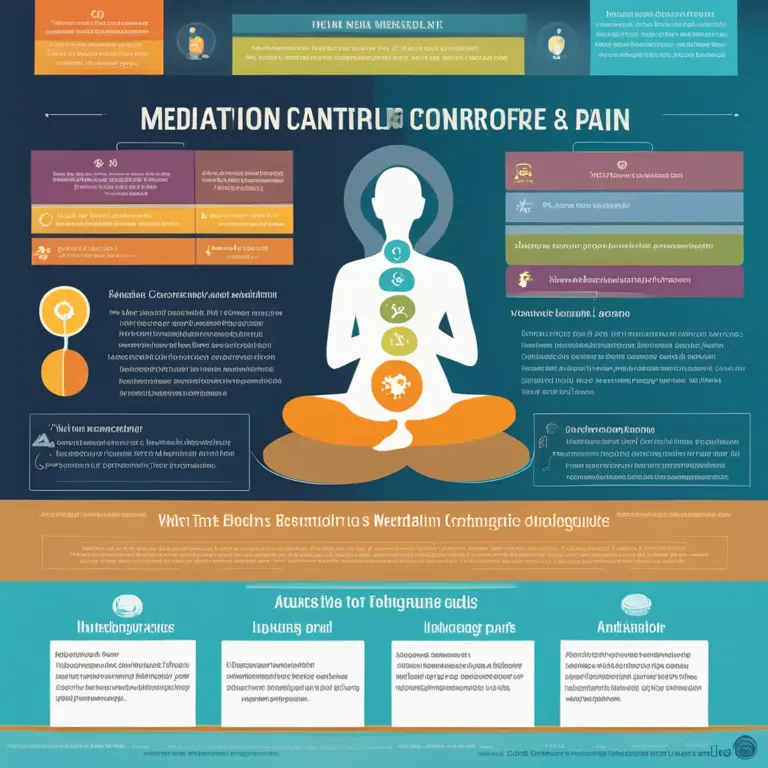
Ease Your Pain Through Meditation Techniques
Discover how meditation practices can contribute to pain management and enhance your overall wellbeing in our insightful article.
article by Hina Kurosawa
The Role of Meditation in Pain Relief
Meditation has long been esteemed for its profound impact on mental tranquility and emotional balance. However, its role in managing physical discomfort is earning significant recognition. Contemporary research posits that regular meditation practice not only soothes the mind but also lessens sensitivity to pain. This is believed to occur due to meditation's ability to alter pain perception, thereby diminishing the overall experience of discomfort. Such findings are encouraging for individuals seeking non-pharmaceutical methods to cope with chronic pain.

Understanding Pain and Perception
Pain is not merely a sensation but also a complex experience influenced by our emotions, thoughts, and psychological state. The brain plays a vital role in how we perceive pain, with certain areas modulating our pain threshold and response. Meditation trains the mind to redirect focus and alter the emotional response to pain. By fostering a detached awareness of discomfort, meditation can help lessen the intensity of pain signals processed by the brain, offering a form of mental analgesia.

Meditation Techniques for Pain Management
Mindfulness meditation is a prominent technique that promotes acute awareness of the present moment, including physical sensations, without judgment. Through this practice, patients learn to observe their pain without emotional reactivity, which can reduce the distress associated with chronic pain conditions. Guided imagery and body scan meditations are other methods that encourage individuals to visualize pain dissipation or divert focus to different body parts, thus diminishing pain awareness.

The Science Supporting Meditation
In recent clinical trials, meditation has demonstrated a capacity to enhance pain tolerance and lower pain-related neural activity. Functional MRI scans show changes in brain regions related to pain processing, such as the anterior cingulate cortex and insula. These neuroscientific discoveries underscore the tangible benefits of meditation practices for individuals struggling with persistent pain and validate the incorporation of meditation into pain treatment plans.

Integrating Meditation into Your Routine
Integrating meditation into daily life for pain management need not be time-consuming or daunting. Short, consistent sessions can yield substantial results. For beginners, joining meditation groups or using apps guided by professionals can lay a solid foundation for practice. It is essential for individuals to find a meditation style that resonates with them and to cultivate patience, as benefits accumulate over time with regular practice.
Overcoming Barriers to Meditation
A common challenge in adopting meditation for pain relief is overcoming initial skepticism and resistance to passive treatments. It is crucial to approach meditation with an open mind and a willingness to engage consistently. Additionally, while meditation can significantly alleviate pain, it should be viewed as part of a comprehensive pain management strategy rather than a standalone remedy. Collaborating with healthcare providers to integrate meditation into a broader therapeutic plan can optimize its effectiveness.
Published: 1/18/2024
Modified: 1/18/2024
More predictions
Come back here soon to learn more about yourself and your future


Mindfulness & Meditation: A Path to Inner Calm
Delve into our Mindfulness Meditation Program designed to guide you on a serene journey towards inner peace and clarity.


Your Mindfulness Meditation Journey Explored
Step into serenity with this primer on conducting mindfulness meditation, designed to align your spirit with the peaceful rhythm of being.


Your Mindfulness Meditation Journey Unlocked
Discover a serene path to mental clarity and peace through this step-by-step guide to mindfulness meditation.